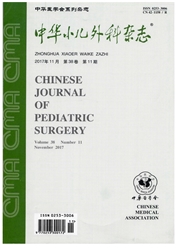

 中文摘要:
中文摘要:
目的探讨钬激光尿道内切开术联合瘢痕电切术治疗小儿尿道狭窄的疗效及安全性。方法对2009年4月至2011年4月收治的48例男性尿道狭窄的患儿,进行钬激光尿道内切开术联合瘢痕电切术,年龄2~15岁,平均5.2岁;病程1个月至2年,平均5个月。记录尿失禁、尿外渗及继发出血等并发症发生情况和狭窄复发率,并联合超声尿流率测定评估疗效和进行为期1年随访。结果患儿手术均顺利,无尿失禁、尿外渗,无继发出血等并发症。拔尿管后2周随访时,最大尿流率和平均尿流率分别为(18.5±4.3)ml/s和(10.4±3.7)ml/s,均显著高于术前(5.2±2.1)ml/s和(3.8±0.7)ml/s,尿流时间为(10.9±4.9)s,显著低于术前(14.6±4.2)S,差异有统计学意义;但8例(16.7%)尿流率测定仍提示尿道梗阻,其中6例进行定期扩张尿道,2例再次钬激光尿道内切开术治疗后定期扩张尿道。共计44例(91.7%)完成1年随访,一次性治愈率达83%。结论钬激光尿道内切开术联合瘢痕电切术具有微创、术后复发率低的优点,是治疗小儿尿道狭窄安全有效的方法之一;尿流率测定有助于术后早期鉴别再次尿道狭窄患儿。
 英文摘要:
英文摘要:
Objective To evluate the clinical efficacy and safety of holmium laser combined with transurethral eleetroic incision in children with urethral stricture. Methods From April 2009 to April 201l, 48 patients with urethral stricture underwent holmium laser combined with transurethrai electroic incision in our centre. The average age of them was 5.2 years old (ranging from 2 to 15 years old). The course of disease lasted averagely 5 months (1 month to 2 years). The complications were recorded including urinary incontinence, urinous infiltration, and secondary hemorrhage, etc. The uroflowmetry and ultrasound were used to evaluate therapeutic outcomes. The follow-up time was 1 year. Results The surgery was successfully conducted in all cases and no complications were found in them. The maximal flow rate and average flow rate after surgery were respective (18. 5 ± 4. 3 ml/s) and (10. 4 ±3. 7 ml/s), which was significantly higher than those in pre-operation (5.2 ±2. lml/s and 3.8 ±0.7ml/s) respectively. The flow time was 10. 9 ± 4. 9 s, which was lower than that in pre-opera- tion (14. 6± 4. 2 s). Although these, urethral obstruction was found in 8 cases (I6. 7%), in which 6 cases of them underwent periodically completed urethral dilatation, and 2 cases underwent secondary holmium laser incision. Totally 44 cases were followed up for one year, and the cure rate for them was up to 83% o Conclusions Holmium laser incision combined with electro-incision for children with urethral stricture is one of safe and effective minimally invasive therapeutic approaches, and uroflowmetry contributes to early identify recurrent urethral stricture.
 同期刊论文项目
同期刊论文项目
 同项目期刊论文
同项目期刊论文
 期刊信息
期刊信息
